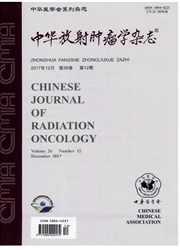

 中文摘要:
中文摘要:
目的 探讨SD大鼠WBI后海马区NFATc4/3信号通路相关因子的改变。方法 将120只1个月龄雄性SD大鼠随机分为5个组,采用4 MeV电子线进行0、2、10、20 Gy单次WBI,在照射后6 h、12 h、1 d、3 d、1周、2周,用蛋白印迹法和RT-PCR方法检测海马区CaN、NFATc4/3、p-NFATc4/3、GSK-3β表达量变化。结果 照射后6、12 hNFATc4/3、p-NFATc4/3表达无变化,照射后1 d随照射剂量增加p-NFATc4/3表达水平与0 Gy相比明显升高(2 GyP=0.014、10 GyP=0.011、20 GyP=0.000),而NFATc4/3的表达水平无变化;照射后3 d、1周和2周NFATc4/3表达水平与0 Gy相比显著下降(3 d 2 GyP=0.040、10 GyP=0.000、20 GyP=0.000、1周2 GyP=0.692、10 GyP=0.032、20 GyP=0.021、2周2 GyP=0.001、10 GyP=0.000、20 GyP=0.000),而p-NFATc4/3表达均无变化。各剂量组间CaN、GSK-3β的表达未随照射时间、剂量变化而变化。结论 电离辐射对海马NFATc4/3信号通路有抑制作用,推测放射性认知功能障碍可能与NFATc4/3信号通路相关。
 英文摘要:
英文摘要:
Objective This study is to investigate the changes in the NFATc4/3 signaling pathway in rat hippocampus after whole brain radiation. Methods A total of 120 one-month-old male Sprague-Dawley rats were randomly divided into four groups to receive whole brain radiation using 4-MeV electron beams with doses of 0(control),2,10,and 20 Gy,respectively,in a single fraction. At 6 hours,12 hours,1 day,3 days,1 week,and 2 weeks after radiation,Western blot and real-time PCR were used to evaluate the changes in expression levels of CaN,NFATc4/3,p-NFATc4/3,and GSK-3β. Results There were no significant changes in the expression of NFATc4/3 or p-NFATc4/3 at 6 and 12 hours after whole brain radiation. At 1 day after radiation,compared with the control group,the expression of p-NFATc4/3 in the radiation groups was significantly increased in a dose-dependent manner (2 Gy:P=0.014;10 Gy:P=0.011;20 Gy:P=0.000);however,there was no significant difference in the expression of NFATc4/3 between the radiation group and the control group. The expression of NFATc4/3 was significantly decreased in the radiation groups than in the control group at day 3(2 Gy:P=0.040;10 Gy:P=0.000;20 Gy:P=0.000),1 week (2 Gy:P=0.692;10 Gy:P=0.032;20 Gy:P=0.021),and 2 weeks (2 Gy:P=0.001;10 Gy:P=0.000;20 Gy:P=0.000) after radiation,while there was no significant difference in the expression of p-NFATc4/3 between any two groups. There were no time-or dose-dependent changes in expression of CaN or GSK-3β. Conclusions Ionization radiation has an inhibitory effect on the NFATc4/3 signaling pathway in rat hippocampus. Combined with our previous results,this study suggests that radiation-induced cognitive dysfunction is associated with the NFATc4/3 signaling pathway.
 同期刊论文项目
同期刊论文项目
 同项目期刊论文
同项目期刊论文
 Forced running exercise attenuates hippocampal neurogenesis impairment and the neurocognitive defici
Forced running exercise attenuates hippocampal neurogenesis impairment and the neurocognitive defici Contrasting effects of Krüppel-like factor 4 on X-ray-induced double-strand and single-strand DNA br
Contrasting effects of Krüppel-like factor 4 on X-ray-induced double-strand and single-strand DNA br 期刊信息
期刊信息
